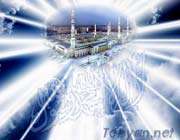What is the Difference between Prophets and Geniuses? (Part 1)

From here the difference between the Prophets and the geniuses also becomes clear. The geniuses are the persons of exalted intellectual power and extraordinary understanding. They work on their own mental data and arrive at a conclusion by means of their intellectual power. They sometimes make mistakes in their calculations. The Prophets besides being blessed with their intellectual and calculating powers are equipped with an additional power called revelation, which the geniuses lack.
Hence there can be no comparison between the geniuses and the Prophets. They belong to two different categories. We can make a comparison between the seeing or the hearing power of two persons, but we cannot compare one man's seeing power with another man's hearing power and say which is stronger. The geniuses have an extraordinary thinking power, whereas the Prophets have quite a different power called revelation. They maintain a close contact with the Source of existence. Therefore it is wrong to draw a comparison between the two.
(1) Guidance:
The Prophethood begins with a spiritual journey from the creation to Allah and gain proximity to Him, which implies turning away from the externality to the internality. Anyhow, eventually it ends by the Prophet's returning to the people with a view to reforming human life and guiding it to the right path.
In Arabic there are two words for the Prophet, Nabi and Rasul. The first literally means a bringer of news and the second a messenger.
A Prophet conveys the message of Allah to the people and awakens and organizes their dormant powers. He invites them to Allah and to all that pleases Him, namely peace, cordiality, reformation, non-violence, veracity, uprightness, justice, emancipation from everything ungodly, love and all other virtues. A Prophet delivers humanity from the shackles of submission to base desires and false gods.
Dr. Iqbal describing the difference between the Prophets and all other individuals having 'unitary experience' says:
"The mystic does not wish to return from the repose of his 'unitary experience'; and even when he does return, as he must, his return does not mean much for mankind at large. The Prophet's return is creative. He returns to insert himself into the sweep of time with a view to control the forces of history, and thereby to create a fresh world of ideals. For the mystic the repose of 'unitary experience' is something final; for the Prophet it is the awakening within him and the unleashing psychological forces, calculated to completely transform the human world." (The Reconstruction of Religious Thought in Islam, p. 124).
(2) Sincerity of Purpose:
As the Prophets have a trust in Allah and are never oblivious of the mission entrusted to them by Him, they accomplish their duty with utmost sincerity. They have no aim other than the guidance of humanity as ordered by Allah, and ask for no remuneration for the performance of their mission.
The Holy Qur'an in Surah as h-Shu'ara has summed up what many of the Prophets said to their peoples. Of course every Prophet had a message for his people which were suited to the problems they faced. Anyhow there was a point which was revealed in the message of every Prophet. Each of them said: "I want no remuneration or wages from you". Therefore sincerity is one of the distinguishing features of Prophethood; and that is why the message of the Prophets has always been so firm.
As the Prophets felt that they had been 'raised' and they did not entertain the least doubt about the fact that they had been entrusted with an essential and useful mission, preached their message and defended it with unprecedented firmness and utmost conviction.
When Prophet Musa and his brother, Harun went to Fir'awn, they had no appurtenances with them except the woolen clothes on their body and their wooden staffs in their hands. They asked Fir'awn to accept their message and told him firmly that if he would accept it, his honour would be safeguarded, otherwise he would lose his government. Fir'awn was stunned by what they said.
In the early days of his Prophethood when the number of the Muslims did not exceed that of the fingers of the two hands, the Holy Prophet of Islam one day, known in history as the Day of the Warning, assembled elders of the Bani Hashim, conveyed his message to them and firmly and expressly told them that his religion was going to spread throughout the world and that it was in their own interest to embrace it. To them these words were unbelievable. They looked at each other with wide open eyes and dispersed without uttering a word.
When his uncle, Abu Talib conveyed to him the message of the Quraysh, saying that they were willing to select him their king, to give to him in marriage the most beautiful daughter of the tribe and make him the most wealthy member of their society, provided he gave up his preaching's, the Holy Prophet said in reply that he was not going to budge an inch from his sacred mission even if they put the sun in one of his hands and the moon in the other.
Just as infallibility is a necessary outcome of a Prophet's communication with Allah, similarly sincerity and firmness are also the essential characteristics of Prophethood.
Taken from Man and Universe By Sheikh Murteza Mutaharri
Source: najaf.org